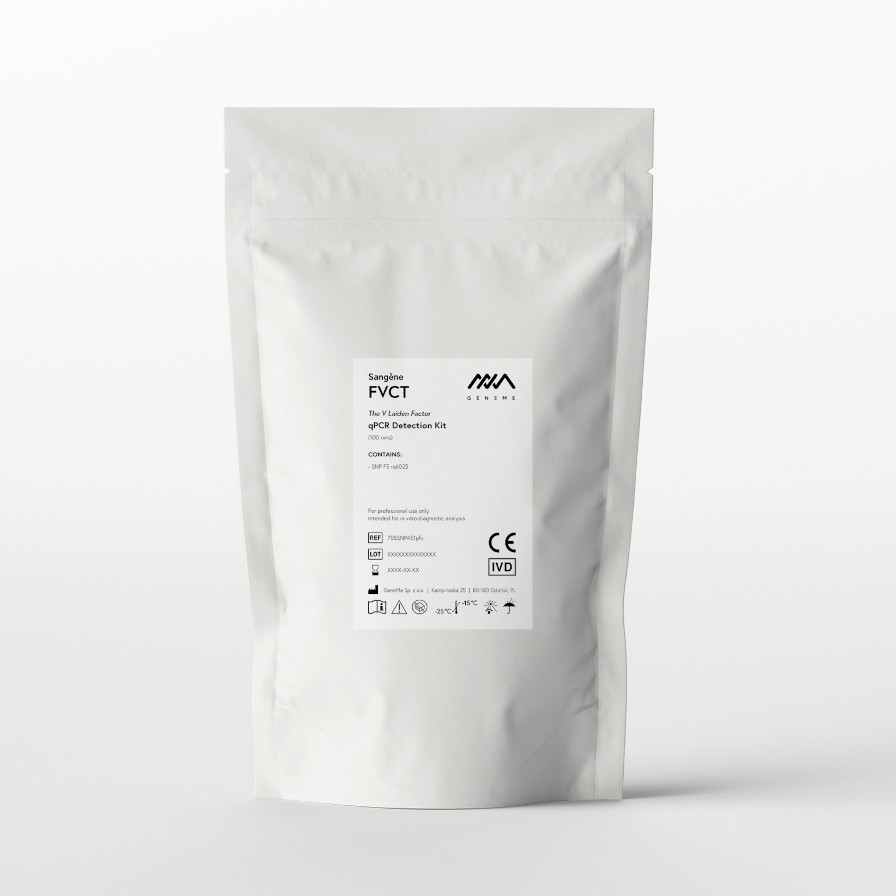FVCT
(FVL Polymorphism)
qPCR SNP Detection Kit

Description
Gene F5 is responsible for factor V. Factor V (Leiden factor) is a blood coagulation factor whose active form is required for the proper conversion of prothrombin to thrombin. This mutation causes disturbances in haemostasis in the body, leading to an increased risk of thromboembolic changes or habitual miscarriages.
REF. NUMBER
755SNP451pfv
PREDISPOSITION
FVL Polymorphism
ANALYSED GENE
F5
IDENTIFIED POLYMORPHISM
rs6025
KIT CONTENTS
1 × Nuclease-Free Water
1 × 2xSNP MasterMix
1 × Oligos Set
1 × Positive Control Set
QUANTITY
100 rxns
STORAGE CONDITIONS
-25°C to -15°C
CERTIFICATES
More Information
Did you know...?
Thrombophilia is a congenital (genetically determined) or acquired thromboembolic complications predisposition. The clots that form block the veins, obstructing blood circulation and ischemia. During the disease there is an increased risk of blood clots in the deep veins, mainly in the legs and arms. Pulmonary embolism is also possible. Thrombophilia also causes thrombus formation in the vessels of the abdominal cavity and the venous sinuses of the brain.
What is the course of thrombophilia in pregnant women?
Thrombophilia is a dangerous disease in pregnant women. Pregnancy is accompanied by hypercoagulation (an increase in blood clotting is the natural preparation of a woman’s body for childbirth), which may interact with thrombophilia as an additional risk factor. The presence of inherited thrombophilia is a risk factor for maternal thromboembolism and adverse pregnancy outcomes, including fetal loss in the second and third trimesters, placental abruption, severe intrauterine growth restriction, and early onset of severe preeclampsia due to vascular-placental insufficiency.
How the test is performed?
The test is based on the PCR method, which enables precise determination of the genotype and thus the risk of developing thrombophilia. Congenital thrombophilia is caused by genetic mutations, most often in the prothrombin gene (blood coagulation factor II) and factor V. In the course of the study, the polymorphism of the F5 gene is analyzed. The Leiden factor (factor F5) is one of the most common and inherited risk factors for thrombosis.
Why is it worth doing a genetic test?
Interpretation of the obtained results, based on the IFU of the product included in the kit, allows for the preparation of a detailed report containing both the genotype description and recommendations indicating the further diagnostic path. The test we offer is relatively quick, uncomplicated and does not require a lot of work.
What can be done after the test result?
In the case of an unfavorable variant of the gene, it is important to follow the recommendations and consult a doctor. Awareness of the presence of the mutation, i.e. an increased risk of hypercoagulability, will allow for the rapid implementation of anticoagulant therapy and avoid serious complications in the future. It will also help a woman to properly prepare for pregnancy, and the doctor will properly guide her in order to avoid complications.